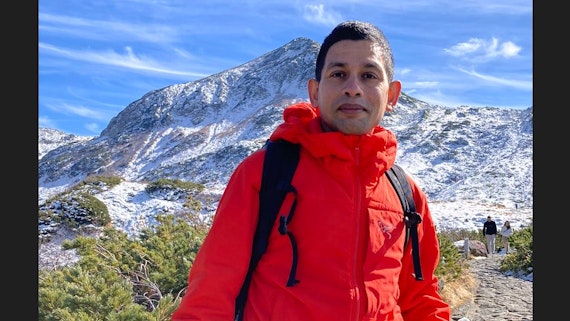Cardiff-Japanese Lecture Series: Landscape History and Challenges for Environmental Sustainability in Protected Areas of Japan: Insights from the North Japan Alps, Shiretoko Peninsula and Shirakami Mountains
This event has ended.
Contact
Add to calendar

A public lecture with Dr Abhik Chakraborty (Wakayama University), as part of the Cardiff-Japanese Lecture Series which explores sociocultural aspects of Japanese language learning. The event is funded by the Japan Foundation, London. Recordings of the Cardiff-Japanese Lecture Series are available to watch on our YouTube channel.
About the series
Students of Japanese as a Foreign Language have fewer opportunities to grasp relevant contemporary information or understand cultural contexts because they study outside Japan. Furthermore, recognising Japanese society in a broader sense and considering how their own Japanese language ability may be applied to their own futures are challenges for such learners. It is therefore essential not only to learn the target language but also to know the multifaceted aspects of the country. Moreover, teachers involved in Japanese language education outside Japan need support in obtaining and sharing up-to-date information reflecting many of the current trends and norms in contemporary Japanese society, in order to provide a more authentic learning experience.
The Cardiff-Japanese Lecture Series aims to explore and understand sociocultural aspects of language learning for those studying Japanese language and culture at Cardiff University, as well as various learners, teachers and researchers with an interest in Japan.
Abstract
Japan’s protected areas have always faced a unique tension, as they are modeled after national parks in the US but at the same time contain a very high user footprint due to intense urbanization of surrounding areas.
In this talk, I draw lessons from my research at three such sites—the North Japan Alps (Chubu Sangaku National Park) in central Honshu, the Shiretoko Peninsula in Hokkaido, and the Shirakami Mountains (Shirakami Sanchi) in northern Honshu. The North Japan Alps area features some of the most popular peaks in the archipelago; and the Shiretoko and Shirakami Sanchi areas are UNESCO World Natural Heritage Sites. These areas are also important refugia for several endangered species and contain important ecosystems. However, these areas currently face significant challenges for environmental sustainability; many of those challenges stem from the landscape history of these places that hide ecological tensions dating back to early modern Japan. During the postwar phase, these places witnessed a drive towards ‘touristification’—which ironically was boosted with World Heritage status for Shiretoko and Shirakami Sanchi—even as the ecological situation did not witness marked improvement. Ongoing efforts to manage these landscapes in a sustainable manner mostly fall short of addressing the ecological integrity of these places and redressing past damages to their biophysical components.
While my research draws from local experiences and voices, I make a conscious effort to venture beyond the human parameters and try to understand the challenges for environmental sustainability for these places by taking their non-human inhabitants and actors into account. The resultant insights are not only relevant for Japan but are also pertinent for many other areas that are witnessing similar challenges in the Anthropocene.
Biography
Dr Abhik Chakraborty works for the Faculty of Tourism at Wakayama University in Japan. He has worked as the lead editor and author for Springer's 'Natural Heritage of Japan', the first edited monograph in English on the geology, geomorphology and ecological aspects of the Japanese Islands. He has also edited the Routledge volume 'Rivers & Society'. He researches critical change pathways in mountain environments, geo-ecological interactions in highlands, anthropogenic change in protected areas (PAs), UNESCO Natural Heritage sites, and highland watersheds to understand how humans affect earth surface processes in the Anthropocene.
Event format & recording
The event will take place online as a Zoom webinar and will be recorded for publication after the event.
Simultaneous Translation
The event will be delivered in the medium of English. You are welcome to ask questions in the medium of Welsh during the Q&A session. If you intend to do this, please contact mlang-events@cardiff.ac.uk by Wednesday 30 November to request simultaneous translation. Please note that 10% or more of those planning to attend will need to request this provision in order for it to be sourced and will be subject to resource availability.
Registration
Please register to attend this event by clicking on the 'Book places' button on the left hand side of this page.
Data protection notice
Please note that when registering, your data will be held in accordance with our Data Protection Notice. We will process the personal data you provide to us in accordance with data protection regulations.